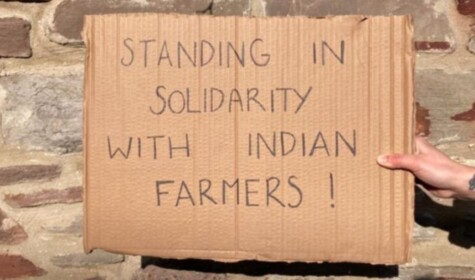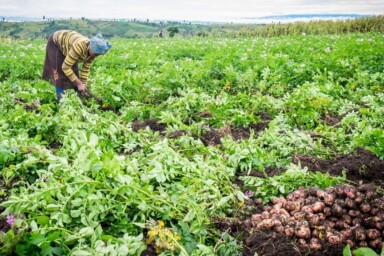I am embarrassed to admit that it wasn’t until watching a session at the recent ORFC that I became fully aware of the farmers’ protests that have been happening in India. The protests have not had the media attention they deserve as the world continues to struggle with the ongoing pandemic and the dangerous and disruptive run-up to the inauguration of a new American President that dominated the news for the past few weeks. Yet the protests are important and we cannot afford to lose sight of what is at stake for these farmers.
The Indian farmers’ protests reflect deep cracks in our food systems, exposing the harsh inequalities that shape contemporary Indian agriculture – and are mirrored by similar small-scale farming systems across the globe. Despite the geographical distance at which such events are occurring, it is crucial to realise that, as Westerners, we are also involved in these struggles, more so than we may realise. The current fate of small-scale Indian farmers is in fact deeply linked to our own history of economic growth and so-called ‘development’, which is why it is vital that we show our support.
Farming is the main source of employment in India. According to the FAO, it contributes towards the livelihoods of up to 70% of rural households and employs 59% of the working population. The country’s varied climate and rich diversity of landscapes put India in a powerful position for international agriculture, ranking first in the production of pulses, milk and jute, and second for the production of rice, wheat, sugarcane, groundnut, fruit, vegetables and cotton.
Farming is more than a fundamental pillar of the country’s economy, however. For the farmers themselves, it reflects a deep sense of connection and belonging to the land, that can be traced back for generations – a connection which is currently being brutally overlooked by India’s Prime Minister, Narendra Modi. This, in combination with the increasing economic instability and social inequalities of the sector, has sparked the largest protest that the farming community has witnessed for decades.
In June 2020, Prime Minister Modi introduced three new agricultural laws, without the consent of the country’s farmers or Parliament. The Indian farming system is complex, making these laws difficult to grasp from an external perspective, but, in essence, they minimise governmental support and regulations in agriculture. Each law targets a particular area in which current rules will be loosened: production, storage and sale of crops. As a result, small-scale farmers – who represent over 80% of the agricultural workforce – will be left with very little control over the market, as corporations and private investors gain the upper hand.
These laws will allow the complete deregulation and corporatisation of Indian agriculture. They have been unanimously rejected by Indian farmers, who understand that such changes will effectively dismantle the basic support system upon which they rely. The Prime Minister, on the other hand, insists that the laws will open up exciting opportunities for India, attracting foreign investment and encouraging economic competition on both a national and global scale. He is essentially turning a blind eye to the farmers’ needs and demands.
In the face of such disregard, hundreds of thousands of farmers from the Northern states of Punjab and Haryana travelled to New Delhi to protest in November 2020. They blocked several major highways around the city and, despite the police’s violent efforts to stop them, successfully set up camp for their demonstration – where they remain to this day, nearly two months on. They have organised community kitchens, laundry services, medical facilities and even libraries, and gained the support of the general public with their passionate yet peaceful demonstration. They are, therefore, fully prepared to stay put and have no intention of leaving until the Government agrees to meet their demands by repealing the three agricultural laws and ensuring a ‘Minimum Support Price’ for all major crops.
The demonstration was clearly triggered by the unwelcome reforms, and the lack of consultation with the farmers left them feeling angry and cheated. The context of these changes and the harmful repercussions they are having on Indian farmers connect to a much broader picture, in which the driving force may not necessarily be the current Indian Prime Minister, but a wider set of ideals and beliefs spread by a specifically Western world view.
The 1970s marked a real turning point in global agriculture. Triggered by growing concerns in the US around rising population numbers and world hunger, there were major efforts to increase agricultural efficiency and productivity, leading to what is known as the ‘Green Revolution’. Portrayed as a generous helping hand, new Western techniques and tools gradually replaced traditional modes of farming across the Global South – starting with India. Chemical fertilisers, mechanised tools and patented seeds embodied the solution to food security, all made available through heavy subsidisation.
The immediate results were astonishing. Food shortages were replaced by food surplus. The production of rice and wheat reached record highs, and fears of famine diminished.
The long-term results, on the other hand, weren’t quite so miraculous. The overuse of chemical fertilisers, pesticides and irrigation quickly depleted vast areas of land, leaving farmers in the vicious cycle of needing more and more synthetic fertilisers to keep going, only to cause further damage to the soil.
Although the Green Revolution reportedly ended in the 1970s, the decades that follow show a pattern that could almost be interpreted as its aftermath, or a second phase. Starting in the West, there was an increasingly broad economic and political shift towards neoliberalism. In other words, the free market became seen as the key to prosperity and growth. Government intervention was stripped back and decisions over land, resources and trade transferred to the hands of multinational corporations, leaving farmers dependent on expensive, modern farming techniques without the means to finance them.
This may sound familiar. The process can be witnessed across most of the world – it happened a while ago here in the UK, resulting in disastrous effects on local trade and sustainable food production. The new laws imposed by Prime Minister Modi essentially reflect a decisive shift towards this Western economic and political model, the final step in the Green Revolution’s journey.
If we listen to the farmers in India, who fear their future, or we listen to the farmers here in the UK, who have already lived through similar transitions, it becomes clear that our food systems are broken. This market-driven model of agriculture is harmful for farmers, and it is harmful for our environment. We need to move towards a food system that values small-scale farmers – they are mainly the ones that feed us. We need to support farming techniques that, rather than seeing the land and soil as resources to be exploited, sees them as sacred, finite resources to protect and replenish. Indian farmers are fighting against the Westernisation of agriculture, and perhaps we should too. It is our collective responsibility to support them in these struggles and join them in their demand for a more socially just and environmentally sustainable future, for everyone.







